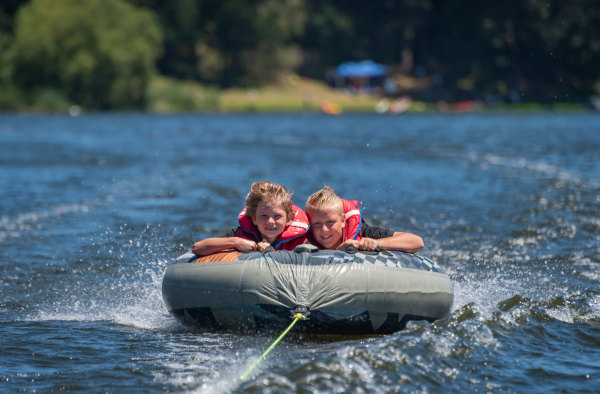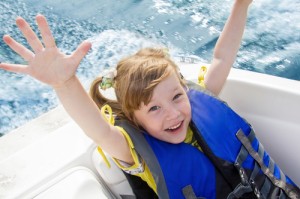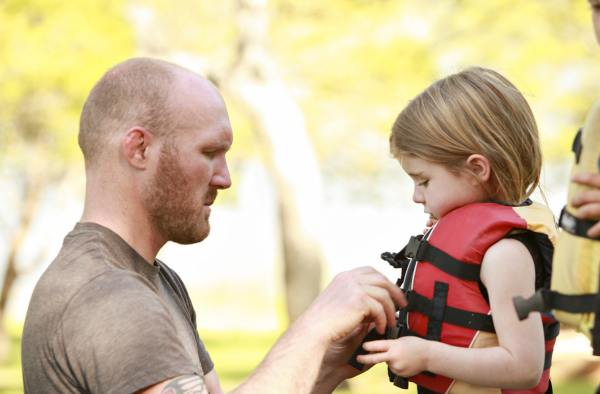For many Michiganders, some of the earliest and most joyful memories of being on the water are centered around tubing. Tubing, or being towed behind a boat on an inflatable tube, is a wildly popular pastime for many Michigan boaters and their families.
Although tubing and other activities like waterskiing and wakeboarding are addictingly fun, they present real safety risks and legal hazards to participants. The aim of this blog is to advise readers on how to safely tow tubers, wakeboarders, or water skiers and explain the legal requirements for such activities.
Michigan Law: The Basics of Legal Towing
Getting towed on the back of a boat is fun. It’s an experience that heightens your senses and makes you feel alive. Part of what makes getting towed so fun, is the element of controlled risk that participants get to partake in – key word being controlled. Due to the dangerous nature of tubing, wakeboarding, and water skiing, these activities are heavily regulated to ensure the safety of everyone involved. Here is an overview of the essential laws to know regarding towing people on the water.
Observer Requirement: One of the most important legal regulations to abide by while towing someone is the observer requirement. Michigan law requires one person aboard the towing vessel to assume the responsibility of spotter. It’s the spotter’s job to keep their eye on the person being towed. The spotter must be able to easily communicate with the vessel operator and give them updates on the towee’s condition.
This allows the operator to fully focus on the water ahead of them, without fear of losing track of the person being towed. Mirrors alone do not fulfill the requirement of having a spotter, except in some circumstances where approved individuals are competing in (or are practicing for) a water skiing tournament.
Personal Flotation Devices (PFDs): Any individual being towed is required to wear a U.S. Coast Guard-approved personal flotation device. Type 1, 2, & 3 PFDs can all satisfy the requirement for tubers and skiers – just make sure the PFD you choose is not inflatable. Inflatable PFDs do not satisfy the requirement.
Towing Time Restrictions: The time at which you are allowed to tow individuals is yet another aspect of these regulations. In Michigan, you are not allowed to tow or be towed from the back of a boat or PWC from 1 hour after sunset to 1 hour prior to sunrise.
Distance Regulations: The last (and arguably most important) aspect of Michigan water-towing laws are the distance regulations. Michigan law requires individuals to maintain a minimum distance of 100 ft from:
- The shoreline (if operating in water less than three feet deep)
- Any moored or anchored vessel
- A dock or raft
- Any marked swimming area or person(s) in the water
This distance regulation only applies when the towing boat is moving faster than no-wake speeds.
By abiding by the minimum distance regulations for towing and refraining from operating your boat recklessly, you can do your part in maintaining safe and controlled Michigan waterways.
Penalties for Non-Compliance: So, what happens if you decide to break the law and tow someone recklessly? The long and short explanation is: you pay up.
Not having a spotter and not wearing a PFD are both state civil infractions that carry a fine of $100. The fine for not wearing a PFD is also applicable to individuals (over the age of 16) being towed (in addition to the vessel operator).
Violating the towing time restrictions is also a civil infraction that carries a heftier fine of up to $500.
Violating the minimum distance regulation is potentially the most serious offense. On the Great Lakes, Lake St. Clair, and the St. Clair River, violation of the minimum distance regulation is considered a civil infraction that carries a fine of up to $500. Elsewhere, this offense is considered more severe. Outside of the mentioned bodies of water, violation of the minimum distance regulation is considered a misdemeanor punishable by imprisonment for no more than 90 days and a fine of up to $500.
Safety Tips: How to Keep Your Riders and Crew Protected
Outside of the legal requirements, here are a few additional safety tips to keep in mind next time you head out for some towing action on the water.
Pre-Tow Checklist: Before leaving for a day on the water, it’s a good idea to have a checklist of pre-departure safety protocols to run through. Some good action items to include on your checklist might be:
- Check tow rope condition (do not use if frays are found)
- Ensure all passengers have a well-fitting PFD
- Inspect the condition of tubes and or ski gear (look for missing or lose handles, tears in equipment, or anything that may malfunction while out on the water)
- Ensure a first aid kit is aboard your vessel in the event of an emergency
Know Your Surroundings: Towing somebody on a boat is inherently dangerous. As a driver, you are responsible for the health and safety of the person being towed on the back of your vessel. You must do everything in your power as a driver to ensure that the person (people) you are towing remains safe.
This means you should avoid docks, swimmers, no wake zones, and other structures in the water that could potentially be hazardous to persons being towed. Being that the driver of a tuber or water skier needs to be hyper-familiar with their surroundings, it is probably not a good idea to have someone drive that is not well-acquainted with the body of water you are on.
Emergency Protocol: In the event disaster strikes and an accident happens, it’s important to have a clear and easy to follow emergency protocol in place.
For starters, if a rider falls from the tube or skis they are being towed on, be sure to circle back to them – do not reverse! Reversing too quickly and too close to the person in the water can result in horrific propeller injuries. Always be sure to turn off all engines while the person in the water is re-entering the boat or is remounting their tube (or skis).
Another good protocol to have in place is a predetermined assortment of hand signals that the person being towed can use to alert the driver and spotter of potential danger or injuries.
Finally, it is also a good idea to have some sort of throwable flotation device on deck, to use in the event that the person in the water loses their PFD or is still struggling to stay afloat with it on.
Get David Get Paid
Tubing is fun – except for when it’s not. If you or a loved one was injured during your last tubing or water skiing outing, reach out to Femminineo Law today!
The team here at Femminineo Law has years of experience dealing with all sorts of water-borne mishaps. Get the trusted name in Michigan maritime law. Get David. Get Paid.
Give us a call at 855-65-CRASH today, or visit our website at getdavidgetpaid.com.



